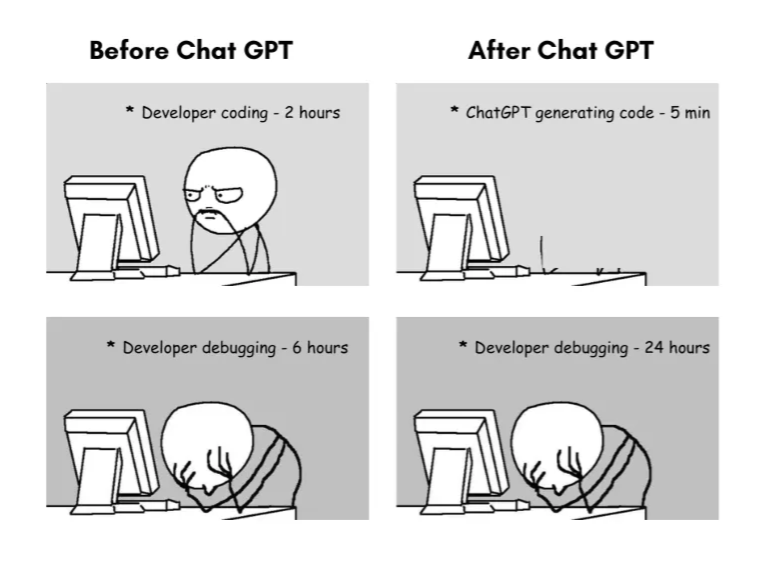These days, you can hardly go a day without hearing or reading about AI, especially if you work within the tech community. This is not to say the buzz of AI exists only in the tech ecosystem, it is the ultimate name-drop in any sphere since OpenAI released ChatGPT in November 2022. Everyone who wants to sound cool just mentions AI along with other gibberish they have to say on social media.

AI however has become truly worthy of mention since the progress OpenAI made with generative AI and ChatGPT. According to AltIndex, the global AI industry has more than doubled its value in just three years to a massive $240 billion, along with a quarter of a billion users worldwide. With all this progress and buzz, people in tech — programmers, data analysts, product managers, and business people alike — are wondering if AI will take their jobs or not. As if to say their fear is not unfounded, Cognition Labs, a San Fransisco-based AI Research Company, in March 2024, released Devin AI, the world’s first AI software engineer, and announced that Devin AI has applied for about 10,000 coding jobs online. While in-depth analysis shows that Devin AI still has a long way to go before it could become a real threat to developers, product managers are asking what about us? What is the future of product management in the face of AI? I recently went through the AI for Product Manager Course from Pendo x Mind the Product x Google and it seems to have some of the answers to questions that have been bugging product managers in recent times. I will try my best to give you the except of the course as much as I can.
You can register for the course here https://www.productledcertified.com/ai-for-product-management
AI Defined
AI or Artificial Intelligence is the ability of a machine to perform cognitive functions we usually associate with human intelligence. The discipline of AI is quite broad and made up of different sub-fields, e.g. machine learning, deep learning, natural language processing, generative AI, etc.
Two Ways Product Managers Can Think of AI
i. As a tool to help you build products and improve internal processes.
ii. As a capability you can build into your product in the form of AI-powered features.
The training focused on number the first one. AI should not just improve products incrementally, but make them exponentially better. Unsurprisingly a study by Pendo and Product Collective conducted a global survey of 1200 companies to gauge the extent to which traditional businesses are requiring the talents, tools, and strategies typically used by companies as they undergo digital transformations. Unsurprisingly AI was one of the topics of the key findings. The study found 44% of company leaders rank AI and machine learning as the most needed to achieve business goals while just 19% of contributors believe those skills should be prioritized. According to Trisha Price, Chief Product Officer at Pendo, this captures the current state of AI. While the leadership is bullish about AI, those who are likely to utilize the technology don’t share the same feelings. They seem to be in fear of AI because it can potentially replace them.

Product managers should feel more confident and embrace AI, learn to utilize it in their everyday tasks, and use it to make their products exponentially better. According to Steve Richardson a product engineer at Google Cloud, there are still many unknowns about AI, it already has a place in the world of product management and it is in the product manager’s best interest to start leveraging it in their development practices if they aren’t already. We are in the early stages of what is going to be a long journey of AI in product management, it is exciting to think of what AI can do for us more efficiently, this is where we are today — product managers are still doing what they usually do and it doesn’t seem like AI will replace product managers anytime soon. But it is a tool that can help automate and speed up tasks.
It is Helpful to Think of AI’s Place in Building Products in Three Categories
i. Data Analysis — A large part of a product manager’s job is in collecting and analyzing quantitative data like product usage and user journeys and qualitative data like consumer feedback and net promoter scores (NPS). AI has a huge role to play here with pattern recognition which is a data analysis method that uses machine learning algorithms to automatically find patterns and trends in a data set. Instead of spending time to analyze, product managers can lean on AI to do this for them, then dig into any themes they want to examine more closely. This will aid decision-making in the areas of product discovery, roadmap planning, product-led growth strategies, etc.
ii. Experimentation — If product managers are not spending all their time combing through data, they will have a lot more time for experimentation and will likely be more willing to develop more tests to run and might even run tests automatically. This experimental approach to innovation will allow us to learn what’s working and implement change quickly.
iii. Communication — Product managers are constantly communicating about ideas, priorities, and plans, especially since they work with so many cross-functional teams. AI can also help automate the creation of things like user stories, personas, product requirement docs, release notes, and the like. In the future, nearly everything about communication will be improved and optimized with AI. The product manager will still be responsible for providing the information needed as prompt but AI technology will help remove a lot of the manual work.
Two Areas of Product Management AI Will Only Amplify Not Replace
i. Being Customer-Centric — This will always be foundational to the product manager’s role. How we analyze users and collect their feedback might change but being able to translate customers’ needs into a product will be a fundamental skill that isn’t going anywhere.
ii. Having A Good Business Sense — The role of being able to make greater business decisions that tie to positive impact which requires a holistic view into your company’s goals, customer, and strategic direction.
AI will enable product managers to create business cases much more easily for the things they want to build. In this, product managers should see AI as a tool that empowers them to build better products. It is a partner, not a threat because AI frees up a product manager to create and innovate more. For instance, look at customer feedback and NPS, historically product managers come through these qualitative data manually, without machine learning, they manually comb through qualitative data, categorize data and analyze trends, put together recommendations to share with their teams; but now with little addition of machine learning product managers get hours of their day back, spend less time analyzing qualitative data, and spend more time on strategic projects and innovations.
So AI is following the same general pattern that technological changes of two decades ago followed. Digital streaming didn’t take over TV but it is rather enhancing it, cloud computing changed traditional methods of delivering products and services, freeing up space and funds, empowering companies to focus on rapid improvements, and shortening the time to value. Same way renewable energy and sustainable technology provide options for us to reduce carbon footprints, creating a cleaner world. At times like these, product managers should see massive changes as an opportunity to create for the customers, this AI moment is no different.

Every Product Manager is an AI Product Manager
AI existed in product management before the AI boom. An AI product manager is someone who uses AI, deep learning, or machine learning to build and improve products. The goal of a modern product manager is to drive business outcomes and AI automatically helps you to achieve those outcomes faster and more effectively, helping product managers deliver more value to customers. Again, AI does not mean the end of the product manager role but it is going to change.
Ways Product Managers Can Leverage AI in Their Role
i. Product Analytics — Getting data more quickly similar to how no-code tools help non-technical teams to study and solve problems on their own and save time and money. Pendo and Mind the Product survey shows that 66% of product leaders trust AI to summarize and analyze results but only 15% are leveraging it. Product managers are advised to just start leveraging AI for data analysis no matter how small. You don’t have to change everything with AI-powered automation but starting small is key.
ii. Customer Feedback and NPS Responses — Natural language processing can analyze feedback and NPS, open text responses related to specific features and product areas and extract common pain points and themes from them. The product manager has a clear understanding of which problems are most pressing or common and should prioritize them.
iii. Roadmap Optimization and Feature Prioritization — AI can also help product managers ideate and build new functionality more efficiently. For example AI based algorithms can help you optimize the product roadmap by analyzing historical data and predicting the impact of specific features on things like retention, user satisfaction, and revenue. It can also help you prioritize which features to hold based on the potential impact on product success.
iv. AI and Product Planning — AI also has a role to play in the product planning stage with its ability to analyze large amounts of data from multiple sources, AI can generate user stories and personas based on product usage, market research, user surveys, and more.
v. Backlog Management — AI can also assist with backlog management, helping product teams identify the most valuable backlog items, break them down into smaller tasks, and estimate the efforts they will require.
vi. In-App Copy — AI can also be used to write in-app content for in-app communication. You can write a prompt that includes the tone and type of thing you want to say and AI will be leveraged to flesh it out. Your product experience platform might also use AI to create a simple or multi-step guide to reduce the time it takes to get key messages in front of users.
These are just a few examples of AI use cases in Product management and there aren’t necessarily dedicated tools to do all of these but they are very possible with a little research here and there.
This article was first published on Kingsley Nwose’s Medium handle, as an excerpt to the AI for Product Manager Course by Pendo x Mind the Product x Google. Click on this text to read the same article on Medium.
